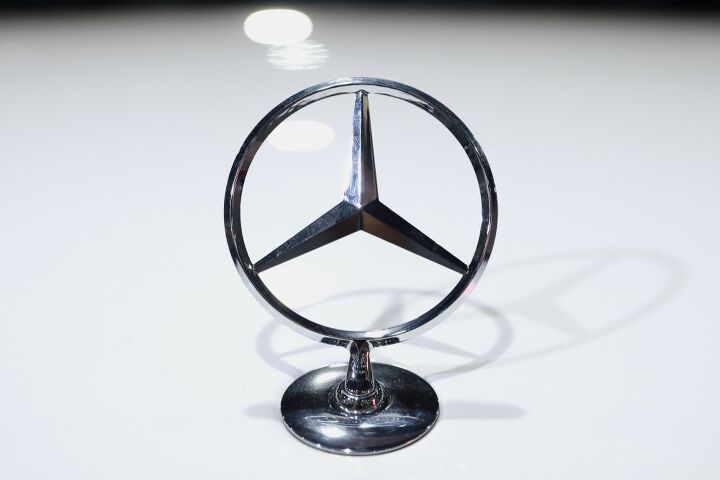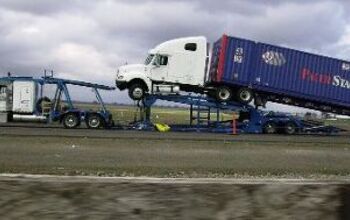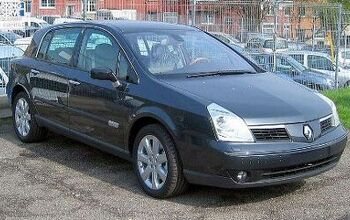What Ever Happened to Mercedes' Dieselgate?

After Volkswagen admitted to equipping some of its diesel-powered autos with illegal software designed to circumvent emissions testing in 2015, every automaker on the planet fell under enhanced scrutiny. By 2016, U.S. regulators were checking on Mercedes-parent Daimler to see if there were any pollutant-related shenanigans taking place behind the scenes. Germany followed suit shortly thereafter, launching its own investigation.
However, with no local updates on the matter, it was presumed Daimler was in the clear — except Germany did find evidence of corporate misdeeds and the company recalled 3 million vehicles in 2017. At the time, we figured the situation would swiftly bleed over into the United States and help wrap things up. But it hasn’t yet and The Detroit News took time this month to ponder what’s taking federal regulators so long.
Busting VW took the government about a year and a half, while the Daimler investigation has been ongoing for double that. The last major breakthrough happened over a year ago, with regulators suggesting Mercedes’ diesels may have been equipped with illegal software. An engine management function called Slipguard apparently recognized whether the car was undergoing testing procedures while another, called Bit 15, halted emissions cleaning after roughly 16 miles of driving. But we haven’t heard much since.
“Three years seems unusual,” John German, a former EPA official and a senior fellow at the International Council on Clean Transportation (the group that commissioned the study that uncovered Volkswagen cheating).
From The Detroit News:
In April, consumer advocacy and environmental groups sent a letter to Congress asking that the investigation be expedited.
“It is past time for greater urgency and action from regulators and Congress on the allegations against Mercedes,” the advocates wrote. “Owners and lessees of Mercedes diesel vehicles have been left without answers or recourse while the illegally polluting vehicles remain on U.S. roads.”
American regulators’ inquiry into Daimler began in 2016 when the Department of Justice asked the company to conduct an internal investigation into its diesel exhaust emissions. Since then, the automaker has stopped selling diesel-powered passenger cars in the U.S.
“To me, that suggests that they had a problem and they’re trying to limit their exposure to that problem,” German said.
Back in the initial stages of the investigation, Daimler claimed that the accusations against it were preposterous and that it would fight back using all legal means at its disposal. It also expressed its distaste for the frequent raids conducted by German prosecutors. While automotive manufacturers found themselves subjected to a bit of a diesel emissions witch hunt following VW’s crisis, some industry analysts assumed it would only be a matter of time before investigators would uncover another major scandal (there were plenty of lesser ones). They appeared to be correct, at least in Europe.
Daimler said it has continued cooperating with U.S. authorities/regulators — neither of which have anything to say on the matter. Mercedes-Benz is also in the midst of a class-action lawsuit over claims that it knowingly sold cars to U.S. customers that polluted more than the company let on. And there’s been added attention stemming from last months’ news that the company is being forced to recall an additional 60,000 Mercedes-Benz models built between 2012 and 2015 in Germany.
It might just be a matter of time before U.S. regulators are forced to say something, even if that something is inconclusive.
[Image: Pixfly/Shutterstock]

A staunch consumer advocate tracking industry trends and regulation. Before joining TTAC, Matt spent a decade working for marketing and research firms based in NYC. Clients included several of the world’s largest automakers, global tire brands, and aftermarket part suppliers. Dissatisfied with the corporate world and resentful of having to wear suits everyday, he pivoted to writing about cars. Since then, that man has become an ardent supporter of the right-to-repair movement, been interviewed on the auto industry by national radio broadcasts, driven more rental cars than anyone ever should, participated in amateur rallying events, and received the requisite minimum training as sanctioned by the SCCA. Handy with a wrench, Matt grew up surrounded by Detroit auto workers and managed to get a pizza delivery job before he was legally eligible. He later found himself driving box trucks through Manhattan, guaranteeing future sympathy for actual truckers. He continues to conduct research pertaining to the automotive sector as an independent contractor and has since moved back to his native Michigan, closer to where the cars are born. A contrarian, Matt claims to prefer understeer — stating that front and all-wheel drive vehicles cater best to his driving style.
More by Matt Posky
Latest Car Reviews
Read moreLatest Product Reviews
Read moreRecent Comments
- Bkojote Allright, actual person who knows trucks here, the article gets it a bit wrong.First off, the Maverick is not at all comparable to a Tacoma just because they're both Hybrids. Or lemme be blunt, the butch-est non-hybrid Maverick Tremor is suitable for 2/10 difficulty trails, a Trailhunter is for about 5/10 or maybe 6/10, just about the upper end of any stock vehicle you're buying from the factory. Aside from a Sasquatch Bronco or Rubicon Jeep Wrangler you're looking at something you're towing back if you want more capability (or perhaps something you /wish/ you were towing back.)Now, where the real world difference should play out is on the trail, where a lot of low speed crawling usually saps efficiency, especially when loaded to the gills. Real world MPG from a 4Runner is about 12-13mpg, So if this loaded-with-overlander-catalog Trailhunter is still pulling in the 20's - or even 18-19, that's a massive improvement.
- Lou_BC "That’s expensive for a midsize pickup" All of the "offroad" midsize trucks fall in that 65k USD range. The ZR2 is probably the cheapest ( without Bison option).
- Lou_BC There are a few in my town. They come out on sunny days. I'd rather spend $29k on a square body Chevy
- Lou_BC I had a 2010 Ford F150 and 2010 Toyota Sienna. The F150 went through 3 sets of brakes and Sienna 2 sets. Similar mileage and 10 year span.4 sets tires on F150. Truck needed a set of rear shocks and front axle seals. The solenoid in the T-case was replaced under warranty. I replaced a "blend door motor" on heater. Sienna needed a water pump and heater blower both on warranty. One TSB then recall on spare tire cable. Has a limp mode due to an engine sensor failure. At 11 years old I had to replace clutch pack in rear diff F150. My ZR2 diesel at 55,000 km. Needs new tires. Duratrac's worn and chewed up. Needed front end alignment (1st time ever on any truck I've owned).Rear brakes worn out. Left pads were to metal. Chevy rear brakes don't like offroad. Weird "inside out" dents in a few spots rear fenders. Typically GM can't really build an offroad truck issue. They won't warranty. Has fender-well liners. Tore off one rear shock protector. Was cheaper to order from GM warehouse through parts supplier than through Chevy dealer. Lots of squeaks and rattles. Infotainment has crashed a few times. Seat heater modual was on recall. One of those post sale retrofit.Local dealer is horrific. If my son can't service or repair it, I'll drive 120 km to the next town. 1st and last Chevy. Love the drivetrain and suspension. Fit and finish mediocre. Dealer sucks.
- MaintenanceCosts You expect everything on Amazon and eBay to be fake, but it's a shame to see fake stuff on Summit Racing. Glad they pulled it.


































Comments
Join the conversation
In Europe, after news of the Volkswagen Diesel Scandal broke, all European, Japanese, Korean etc. manufacturers were investigated, and to nobody’s surprise, most of their gasoline and Diesel cars emitted more pollutants in the real world than under controlled laboratory settings. The dirtiest diesels came from Fiat and Renault, if memory serves me right.
All cars will excede allowable emissions levels during some parts of their drive cycle. This is allowable in the regulations. When you floor it, do you think the emissions are in the normally allowable limit? It can't happen during the whole drive cycle though. When I was a Mercedes tech, those diesels were using AdBlue (DEF) like crazy. We were putting in more than 20liters of the stuff every service. NOx sensors, AdBlue pumps and injectors were constantly failing. I can guarantee you those systems were not being defeated.